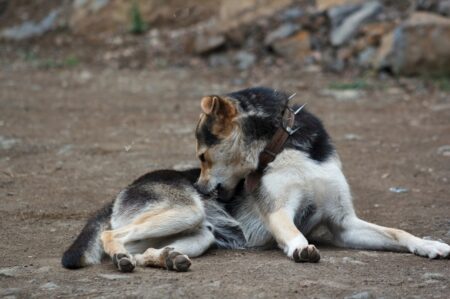What Could Be The Reason Why My Dog Is Constantly Scratching And Biting Himself?
It is possible that your dog may be suffering from an allergy or skin irritation, or may just have a case of parasites such as fleas. It is important to take your dog to the veterinarian for an examination to determine the cause. The veterinarian may recommend a medicated shampoo, ointments, or flea treatments to help with your dog’s discomfort. Additionally, it may be useful to provide your dog with environmental enrichment, such as chew toys, in order to distract him or her from the act of scratching and biting.
What Could Be The Reason Why My Dog Is Constantly Scratching And Biting Himself?
- Fleas – Fleas are one of the primary reasons why your dog may be scratching and biting himself. They feed on the blood of your pet and can cause a great deal of irritation. Signs of fleas include excessive scratching and biting, as well as redness and scabbing from the bites. You should consult your veterinarian for proper treatment, which may include flea shampoo, oral medication, or injections.
- Allergies – Dogs can experience seasonal allergies, just like people can. Pollen, dust, mites, mold, and certain foods are all common allergens in the environment that can cause your dog to scratch and bite himself. In severe cases, your pet may actually show signs of bald patches from acute scratching. Your veterinarian can help you identify the cause of the allergy and recommend treatment.
- Skin Infections – Bacterial and yeast infections can cause significant itching and discomfort for your pet. These infections can sometimes be the result of allergies, but can also be caused by ear mites, parasites, poor grooming, or poor nutrition. You should consult with your veterinarian to determine the best course of treatment.
- Ringworm – Ringworm is a fungal infection that causes circular, itchy patches on the skin. It can be caused by many different types of fungi and should be treated with both topical and oral antifungal medications. These infections are highly contagious, so it’s important to prevent spreading them to you and other pets in the home.
- Hormone Imbalance – A hormonal imbalance can also lead to excessive itching and scratching. Primary causes of this imbalance include hypothyroidism, Cushing’s disease, or improper levels of certain hormones in the body. Your veterinarian may recommend blood tests to determine if your pet has a hormone imbalance.
- Dry Skin – Dry skin can be an issue for some dogs, especially during winter or other months of low humidity. Symptoms of dry skin include itchy patches, redness, flaky skin, and inflammation of the skin. An omega-3 fatty acid supplement can help provide your dog’s skin with additional moisture while bathing with a mild shampoo can help reduce irritation.
- Anxiety – Just like in people, anxiety in dogs can manifest as excessive scratching, biting, and licking. If your dog appears to be scratching or biting himself more than usual, it may be a sign of stress. Talk to your veterinarian about a mild behavior modification program to help reduce anxiety in your pet.
- External Parasites – Along with fleas, other external parasites can cause your pet to scratch and bite himself. Ticks, lice, mites, and various other arthropods can all be the cause of significant discomfort to your pet. Your veterinarian can provide suggestions on how to reduce the number of parasites and treat any skin issues they may have caused.
- Neurological Disorders – Neurological disorders, such as seizure disorders, can cause your pet to experience movements such as scratching and biting themselves. This is the body’s reaction to an electrical imbalance in the brain. Most seizures can be managed with anti-seizure medication and closer monitoring of the pet’s behavior.
- Pain – If your dog has any type of injury or health condition, they may be experiencing discomfort and scratching or biting themselves as a means of alleviating that pain. If you suspect your pet is in pain, contact your veterinarian for proper diagnosis and treatment.
Pruritus in Dogs
Pruritus is the medical term for itchy skin. It occurs in dogs when the skin is irritated or inflamed due to allergies, parasites, fungal infections, skin infections, skin injury, or hormone imbalances. When a dog’s skin becomes irritated, the dog will typically scratch, chew, lick, or rub the affected area until the skin is raw and painful. Symptoms of pruritus include itching, redness, swelling, scabbing, hair loss, or scaly patches. Treatment for pruritus varies depending on the underlying cause. Usually, a combination of prescription medications, shampoos, and other topical treatments are prescribed.
My Puppy is Constantly Scratching And Biting Himself
Your puppy might be scratching and biting himself because he has fleas, is experiencing skin irritation, feels stressed, or is bored. Fleas and other parasites sometimes make themselves at home in an animal’s fur and skin, causing itching and irritation. Stress, either from a change in environment or routine, can also cause dogs to scratch and bite themselves out of frustration. Additionally, a lack of stimulation can lead to a bored pup who scratches and bites as a self-soothing behavior. Finally, the type of food and treats you give your pup may be causing allergic reactions and skin irritation. Consulting a veterinarian is the best way to determine the exact cause of your pup’s scratching and biting.
My Dog is Constantly Scratching And Biting Himself But No Fleas
If your dog is constantly scratching and biting himself but does not have fleas, this could be indicative of an underlying skin condition, such as allergies, dermatitis, or mange. All of these conditions can lead to itching and skin irritation for the dog, causing him to scratch and bite himself in an attempt to soothe the irritation. A veterinarian should be contacted in order to diagnose and treat the condition.
My Dog is Constantly Scratching And Biting Himself Until He Bleeds
It is likely that your dog is experiencing an allergic reaction to something in its environment. This can be things such as dust mites, pollen, certain foods, fleas, or chemicals like shampoo. When a dog has an allergic reaction, he may scratch and bite himself, resulting in itching, irritation, and in severe cases, sores that can bleed. A visit to the vet to discuss which allergens might be causing the problem, as well as treatments to help alleviate your dog’s discomfort, is recommended.
My Dog is Constantly Scratching And Biting Himself And Losing Hair
There are several possible explanations for why your dog is scratching and biting himself and losing hair. It is possible that your dog has an allergy or skin infection such as fleas, mites, or an allergic reaction to a topical product or environment. It is also likely that your dog is displaying signs of anxiety, which could manifest as compulsive behavior such as scratching or hair-pulling. If your dog’s scratching is persistent, it is advised to take him to the vet for an examination.
SEE ALSO: What To Feed A Dog With Diarrhea: Foods To Try
Dog Scratching Belly With Hind Legs
Dog scratching their belly with their hind legs is a normal and natural behavior. It is usually done to remove pesky bugs or tickle their belly and is believed to help soothe an itchy ankle or foot. It also helps to promote circulation and can help distribute the natural oils that build up on the dog’s coat. In some cases, the behavior may also be a sign of anxiety or boredom.
Diagnosis of Itching, Scratching, and Chewing (Pruritis) in Dogs
To diagnose pruritis, your veterinarian will perform a complete physical exam and order appropriate laboratory tests/imaging studies if needed. They will also perform a combination of skin cell, bacterial, fungal, and allergy testing to look for underlying causes of the itching. Your veterinarian may also recommend a hypoallergenic food trial or medications such as antihistamines, steroids, and fatty acids. By narrowing down the cause of pruritis, your veterinarian can develop the most appropriate treatment plan for your dog.
Symptoms of Itching, Scratching, and Chewing (Pruritis) in Dogs
- Excessive licking or chewing on the skin
- Redness or inflammation of the skin
- Hot spots or sores on the skin
- Hair loss or bald patches on the body
- Discolored areas of skin
- Scabs, bumps, or welts on the skin
- Unusual odor coming from the skin
- Loss of appetite
- Irritable behavior or restlessness
- Difficulty sleeping
How Do I Stop My Dog From Itching And Biting Itself?
First, it’s important to visit your veterinarian to rule out any medical skin issues, allergies, or parasites. If the veterinarian finds no health issues, then it’s important to properly groom your dog, providing a thorough bath once a month with a shampoo that is specifically designed for pets, and brushing your dog with a slicker brush to help remove dead hair and debris. This helps stimulate the skin and promote healthy hair growth. Additionally, it’s important to keep your dog in a clean environment to avoid any additional allergens or dry skin. Lastly, you can feed your dog a high-quality, grain-free, and allergen-free diet to decrease any skin issues.
Dog Chewing Himself Raw Treatment
If your dog is chewing himself raw, a visit to the veterinarian is in order. Your veterinarian can determine the underlying cause of your dog’s behavior and recommend medications and treatments to address the issue. In the meantime, you can help prevent your dog from further injuring himself by trimming his nails, placing an Elizabethan collar on him, or providing him with distracting toys to help redirect his attention away from the self-mutilation. You should also increase the amount of physical exercise your dog is getting, as it is a known stress reliever and can help to reduce self-mutilation behaviors.
Treatment for Your Dog’s Compulsive Scratching, Licking, and Chewing
The goal of treating compulsive scratching, licking, and chewing in dogs is to eliminate, or at least reduce the behaviors. Treatment includes:
- Restricting access to areas where the behaviors occur: Since dogs often compulsively scratch, lick, or chew due to boredom or stress, owners should try to limit the time the canine spends in areas where the behaviors occur.
- Behavior Modification: Positive reinforcement techniques can be used to reward the dog when it is exhibiting desired behavior. For example, owners might verbally praise or provide treats when the dog is found not exhibiting the behaviors.
- Medication: Veterinarians may prescribe medications to reduce anxiety if the behaviors are highly compulsive.
- Activity/Exercise: Increasing activity levels and providing stimulating activities can help reduce boredom and anxiety.
- Professional Help: If compulsive scratching, licking, and chewing persists, owners should consider consulting with a veterinary behaviorist.
My Dog Is Constantly Scratching And Biting Himself Home Remedies
Home remedies for your dog’s scratching and biting himself can include:
- Bathe your dog in warm water with a gentle, hypoallergenic shampoo and rinse thoroughly.
- Make sure your dog is getting plenty of exercise, at least 30 minutes per day.
- Brush your dog regularly to help remove excess fur and reduce shedding.
- Use a food allergy elimination diet to help determine possible allergens, then gradually reintroduce different types of food to find out which combination suits your dog best.
- Give your dog plenty of chewable toys to help keep him from biting himself.
- Check the environment for any potential irritants that may be causing irritation such as dust mites, pollen, and other allergens.
- Provide a comfortable, stress-free environment for your pet. Make sure he has a comfy place to sleep and access to clean, fresh water.
FAQs
Q. What can I put on my dog to relieve itching home remedies?
A. Home remedies for relieving itching on dogs include oatmeal baths, aloe vera gel, apple cider vinegar, and coconut oil.
Q. Why is my dog suddenly itching and scratching?
A. Your dog may be itching and scratching due to fleas, allergies, dry skin, or other medical conditions.
Q. Why Is My Dog So Itchy?
A. There are many possible reasons why your dog may be itchy, such as allergies, fleas, dry skin, infections, or mites.
SEE ALSO: My Dog Ate Chocolate But Is Acting Fine: Is Anything Wrong?
Conclusion
The most likely cause of a dog constantly scratching and biting itself is skin allergies, flea infestations, or skin infections. In these cases, identifying the source of the irritation and treating it with the proper medications is key to relieving your pup’s discomfort. If your dog is still scratching and biting despite treatment, a trip to the vet may be necessary to rule out other medical issues.
